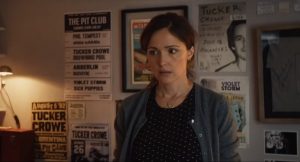![]()
Writer Nick Hornby’s novels often deal with obsessive, troubled men who prize their record collections, favorite sports teams and themselves over all else. Over the years, his books have been converted into films like Fever Pitch, High Fidelity and About a Boy. The latest literary work to get the movie treatment is Juliet, Naked. It features characters with similar traits to his previous works, but focuses attention on the unhappy wife of a middle-aged music enthusiast and the strange events that follow a random comment made online. The film isn’t quite as strong as previous adaptations of the author’s work, but it still features enough wit and charm to earn a recommendation.
 As mentioned, Annie (Rose Byrne) is the long-suffering partner of Duncan (Chris O’Dowd), a university professor and massive fan of 90s artist and one album wonder, Tucker Crowe (Ethan Hawke). After recording a record called Juliet, Crowe vanished from the music scene. Duncan spends his free time updating a website about the reclusive artist, chatting online with friends and coming up with theories on the performer. Annie feels like her life is at a standstill, wanting a family but meeting resistance from Duncan. She’s also sick of Crowe’s music and her significant other’s obsession. When an unplugged version of the record titled Juliet, Naked is released, Annie writes negative comments on Duncan’s site and unexpectedly draws the attention of the artist himself.
As mentioned, Annie (Rose Byrne) is the long-suffering partner of Duncan (Chris O’Dowd), a university professor and massive fan of 90s artist and one album wonder, Tucker Crowe (Ethan Hawke). After recording a record called Juliet, Crowe vanished from the music scene. Duncan spends his free time updating a website about the reclusive artist, chatting online with friends and coming up with theories on the performer. Annie feels like her life is at a standstill, wanting a family but meeting resistance from Duncan. She’s also sick of Crowe’s music and her significant other’s obsession. When an unplugged version of the record titled Juliet, Naked is released, Annie writes negative comments on Duncan’s site and unexpectedly draws the attention of the artist himself.
 Hornby has a knack for writing dialogue in both print and for the screen and this adaptation captures plenty of the author’s trademark interactions between the leads. While it’s an unpleasant situation for Annie, the bickering between the lady and Duncan over his fixation results in some biting jabs. Additionally, the introduction of the middle-aged, damaged Crowe into the mix adds plenty of entertaining moments as he fends off his fan’s questions and sharply debunks his theories. And interestingly, some of Duncan’s comebacks to the musician’s angry stings are equally sharp and perceptive.
Hornby has a knack for writing dialogue in both print and for the screen and this adaptation captures plenty of the author’s trademark interactions between the leads. While it’s an unpleasant situation for Annie, the bickering between the lady and Duncan over his fixation results in some biting jabs. Additionally, the introduction of the middle-aged, damaged Crowe into the mix adds plenty of entertaining moments as he fends off his fan’s questions and sharply debunks his theories. And interestingly, some of Duncan’s comebacks to the musician’s angry stings are equally sharp and perceptive.
 This may be a romantic comedy, but differs in many ways from common films of its ilk. For one, all of these characters are older and have histories. As new relationships are formed and older ones are tested, unexpected complications arise. It’s nice to see a feature in which all of the persons involved are flawed and every decision as well as action has repercussions. This isn’t a romance where the leads are perfect and their romance slick and polished; the entire situation is messy and problematic. The approach, along with the excellent work of the cast, helps create some level of authenticity to the proceedings.
This may be a romantic comedy, but differs in many ways from common films of its ilk. For one, all of these characters are older and have histories. As new relationships are formed and older ones are tested, unexpected complications arise. It’s nice to see a feature in which all of the persons involved are flawed and every decision as well as action has repercussions. This isn’t a romance where the leads are perfect and their romance slick and polished; the entire situation is messy and problematic. The approach, along with the excellent work of the cast, helps create some level of authenticity to the proceedings.
 Admittedly, the movie still follows familiar genre beats. It tries too hard to make Duncan into a heel in order to allow audiences to side with Annie’s burgeoning relationship with Crowe. Still, the antagonism at least allows for some very amusing reactions and cutting comments (one of the best moments comes when Duncan is first introduced to his hero by Annie). And it’s interesting to see a film based on the author’s work that details more of the anguish that a female character might feel about hooking up with one of the fanatical protagonists from his other books.
Admittedly, the movie still follows familiar genre beats. It tries too hard to make Duncan into a heel in order to allow audiences to side with Annie’s burgeoning relationship with Crowe. Still, the antagonism at least allows for some very amusing reactions and cutting comments (one of the best moments comes when Duncan is first introduced to his hero by Annie). And it’s interesting to see a film based on the author’s work that details more of the anguish that a female character might feel about hooking up with one of the fanatical protagonists from his other books.
In the end, Juliet, Naked isn’t going to revolutionize the genre, but it does offer a few enjoyable twists on the formula that add some spice and variety to the mix. It certainly gears to a slightly older audience and might not appeal as strongly to those wanting a glossy, formulaic relationship pic. However, for this reviewer it came as a likeable and welcome change from the usual rom-com fare. This cut is worth a listen.


